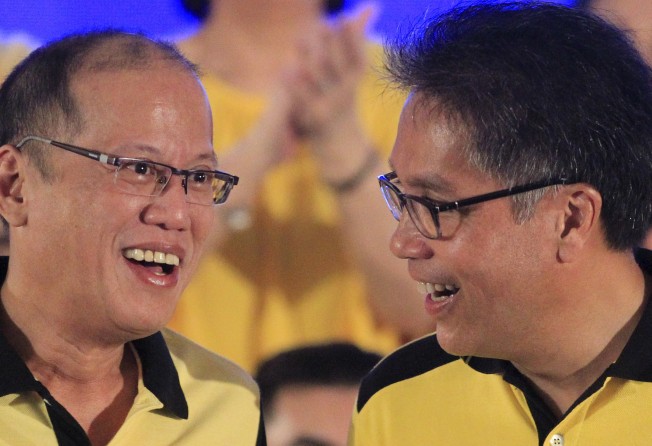
Philippine President Benigno Aquino endorses interior minister Manuel Roxas as next leader, despite poor polling numbers
Aquino said he interviewed three potential candidates ahead of Friday’s endorsement, but in the end chose Roxas.

Philippine President Benigno Aquino endorsed long-time ally Manuel Roxas on Friday for the country’s 2016 presidential election, saying the interior minister was the best person to advance anti-corruption reforms.
“We choose the one who is certain to pursue the straight and narrow path,” said Aquino, alluding to his hallmark anti-graft crusade that he says ushered in unprecedented economic growth in the impoverished archipelago nation.
“In short, I believe that person is none other than Mar Roxas,” the president told cheering members of his Liberal Party, using the minister’s nickname.
The Philippines is set to elect a new leader in May 2016, with contenders required to register their candidacy ahead of a mid-October deadline.
The interior minister is likely to run against populist Vice President Jejomar Binay, who is being investigated by a special prosecutor over graft allegations, and the popular Senator Grace Poe, who had also sought Aquino’s endorsement.
Supporters in yellow clapped and chanted “Roxas Now” as the 58-year-old grandson of the Philippines’ first president choked back tears and thanked the president.
“I accept the challenge,” said Roxas. “I will never stray from the straight and narrow path.”
Aquino said he interviewed three potential candidates ahead of Friday’s endorsement, but in the end chose Roxas, even though he has been polling poorly.
However, analysts say Aquino’s pick was laden with risk.
“On paper, he looks like a competent technocrat and successor,” Richard Javad Heydarian, a political science professor at Manila’s De La Salle University, said.
“But he lacks the popular touch,” Heydarian said of the interior minister, whose wealthy family owns one the capital’s largest commercial centres.
According to recent polls, Roxas trails Binay, whose populist policies as mayor of Manila’s financial district succeeded in winning the hearts of the area’s poor.
Heydarian also warned that Roxas and Poe could split Aquino’s support base, giving Binay an additional edge.
Aquino on Friday downplayed Roxas’ poor polling numbers, saying the Liberal Party needs to do more to promote the presidential hopeful.
The other contenders:

Jejomar "Jojo" Binay, 72
Though currently leading polls, the feisty septuagenarian’s popularity has recently been dented by allegations he illegally enriched himself and built a family dynasty during his 20-year tenure as mayor of Makati, Manila’s financial district.
Short and dark-skinned, Binay has been described in jest as the Philippines’ Barack Obama, the first black US leader. In the 1980s the self-made orphan and trained lawyer represented the victims of human rights abuses perpetrated during the rule of late dictator Ferdinand Marcos.
A close ally of Aquino’s late mother, the democracy icon Corazon Aquino, Binay is relishing a potential rematch with the incumbent’s preferred successor Roxas, whom he beat in the 2010 vice presidential election.

Grace Poe, 46
The former Philippine film censor was Roxas’ rival for Aquino’s endorsement, and toppled Binay from the top of the polls in June. US-based for over a decade until her return to the Philippines in 2004, she is seen as a refreshing new face in a country weary of corruption.
Dumped at a church as a baby and adopted by popular Filipino film action hero Fernando Poe, who died shortly after losing the 2004 presidential election, the younger Poe was a surprise top vote-getter in the 2013 senatorial ballot.
She has yet to make her views known on many major issues, and foes brand her as inexperienced. They also insist she has not lived in the country long enough to satisfy a 10-year residency rule for presidential candidates.